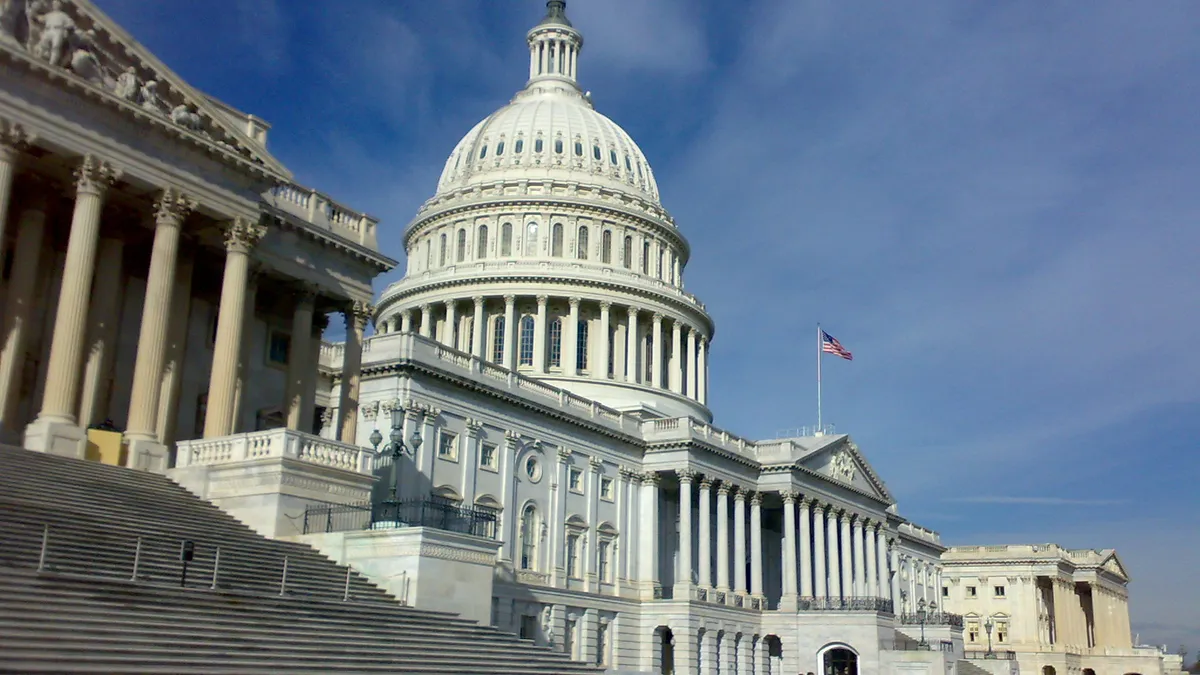Dive Brief:
- A clean electricity standard, which would require utilities across the country to slash emissions, will be part of a broad $3.5 trillion infrastructure deal Democrats hope to pass by budget reconciliation, according Sen. Tina Smith, D-Minn.
- The Biden administration wants Congress to pass a clean electricity standard, but is also prepared to pursue efforts to push utilities to ratchet down their emissions through the federal regulatory process should a national standard fail to make the final bill, according to Gina McCarthy, the White House's national climate adviser.
- McCarthy said the administration believes a national clean energy standard would be more effective in prompting action on part of the utility industry to reduce emissions.
Dive Insight:
The prospects that a clean electricity standard will make it through Congress improved Wednesday, with Sen. Smith tweeting the industry-wide requirement would be in the larger of the two infrastructure bills the Biden administration is hoping to pass.
Democrats are hoping to pass the $3.5 trillion proposal through the budget reconciliation vote, which would avoid an anticipated filibuster in the Senate and could pass on a strictly party-line vote.
BREAKING: Clean Electricty Standard is included in budget deal.
— Senator Tina Smith (@SenTinaSmith) July 14, 2021
CES is the cornerstone of the progressive, practical transformation to a clean energy future we urgently need.
The exact details of the standard have yet to be hammered out, though Smith told The Hill she wants to see a requirement that utilities produce 80% of their power through renewables by 2030.
Smith, who is working on the legislation for the clean electricity standard with Sen. Ben Ray Luján, D-N.M., told The Hill she wants to include not just wind, solar and geothermal, but also nuclear energy and fossil fuels, provided the latter resources use carbon capture technology. However, Smith also said she opposes partial credit for unabated natural gas, despite industry arguments of the fuel's importance as a bridge to a cleaner energy future.
McCarthy also made it clear in an interview on Tuesday that the Biden administration is strongly in favor of such a standard, though she stopped short of calling it a make-or-break provision.
"I don't want to say anything is a red line," said McCarthy at the Bloomberg Sustainable Business Summit. "We have a lot of regulatory authority we intend to use regardless."
But McCarthy also made clear that setting a clean electricity standard for utilities across the United States would be the administration's strong preference.
"What the clean electricity standard says is go, don't wait, go," McCarthy said. "We are going to put you on the schedule. You get out there … and run and keep running."
McCarthy said she sees such a standard acting as a major "motivator" for utilities, helping, in turn, to spur large-scale change in the sector that would be more difficult otherwise.
"Government was not intended to do it all, it was intended to do the innovation," McCarthy said, referring to research being undertaken by the Department of Energy. "In the end, it's all about how do we should the private sector where money can be made. If we can do that, it's just going to climb."
Still, for the $3.5 trillion budget reconciliation bill to clear the Senate, it will have to pass muster with two key moderate Democrats: Sen. Joe Manchin of West Virginia, a major coal state, and Sen. Kyrsten Sinema of Arizona.
The administration is pushing plans for half a billion dollars to support job transitions in coal country, according to McCarthy, noting the coal mining sector has "lost a considerable amount of jobs." McCarthy said she has met with not just Manchin, but also Sen. Sherrod Brown, D-Ohio.
McCarthy said a key part for the Biden administration is the potential for investments in clean energy like clean hydrogen to create jobs and help revive manufacturing in the Ohio Valley, one of the oldest, industrial regions of the country.
"I think there's every opportunity in the world to keep Senator Manchin, not just communicating and talking, but feeling good about the investments that are being made," McCarthy said.
A spokesperson for the Edison Electric Institute said in an email the organization would "support a well-designed clean energy standard that covers all clean energy resources, including existing nuclear and hydropower generation, and provides opportunities to credit new technologies as they become commercially available."
Such a well-designed CES would also "give partial credits to natural gas generation in recognition of its role in integrating renewables, supporting the retirement of coal-based generation, and assuring reliability as new clean, 24/7 resources become commercially available," the spokesperson said.
"We continue to anticipate that the administration would move forward with a robust regulatory agenda and we will continue to engage with them there," said Alex Bond, EEI deputy general counsel, for climate and clean energy. "We've also been engaged with them on the legislative agenda and look forward to continuing these conversations as well as we move forward with implementing our clean energy transformation."













